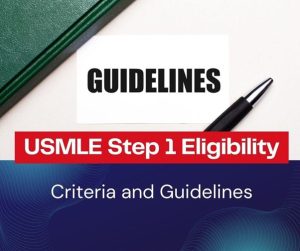Understanding USMLE Step 1 Eligibility: Criteria and Guidelines

If you’re determined to make your medical dreams come true and become a licensed doctor in the US, familiarizing yourself with the United States Medical Licensing Examination (USMLE) is essential. This comprehensive three-step examination assesses your understanding of basic science knowledge, clinical skills, and clinical knowledge. The initial phase, Step 1, focuses on applying scientific principles to medical practice. In this article, we will explore the prerequisites, eligibility criteria, and guidelines for taking Step 1, providing valuable resources to support your preparation on your journey towards becoming a licensed doctor in the US.
Eligibility for the USMLE Exam
As a medical student or graduate, your journey to the USMLE begins with understanding who can take Step 1. The USMLE exam is accessible to three distinct categories of applicants:
- MD Degree Candidates
You fall under this category if you’re a medical student enrolled in or a graduate of a US or Canadian medical school program accredited by the Liaison Committee on Medical Education (LCME).
- DO Degree Candidates
Medical students officially enrolled in, or graduates of, a US medical school leading to the Doctor of Osteopathic (DO) degree, accredited by the Commission on Osteopathic College Accreditation (COCA), are eligible for Step 1.
- Foreign Medical Graduates
If you’re a medical student officially enrolled in or a graduate of a medical school outside the US and Canada, listed in the World Directory of Medical Schools as meeting Educational Commission for Foreign Medical Graduates (ECFMG) eligibility requirements, and meet other ECFMG eligibility criteria, you can register for Step 1.
Depending on your category, including foreign doctors practicing in the US, you can initiate Step 1 registration through the National Board of Medical Examiners (NBME) website or the ECFMG website, providing the necessary documentation regarding your enrollment or graduation status. Keep in mind that examination fees vary based on your category and location.
Choosing an Eligibility Period and Scheduling the Exam
Upon commencing your Step 1 application, you’ll be required to select an eligibility period for taking the exam. An eligibility period constitutes a three-month window allowing you to schedule and complete your examination at any Prometric test center offering USMLE testing. You can choose any eligibility period within 12 months, starting from your application date.
Several factors can influence your selection of an eligibility period:
- Test Center Availability: Check for available test dates at your preferred test center.
- Personal Preferences and Circumstances: Consider your schedule, personal commitments, and deadlines.
- Academic Schedule: Align your eligibility period with your academic schedule and relevant deadlines.
- Preparation Level and Confidence: Ensure you’re adequately prepared and confident about your chosen period.
Use the Prometric website to explore test date availability at different centers. Additionally, you can schedule or reschedule your exam date within your eligibility period through the same platform. Remember that scheduling and rescheduling Step 1 exams involve associated fees and deadlines. For instance, rescheduling your exam date more than 30 days before your scheduled initial test date typically incurs no additional charges. However, rescheduling within 30 days of your test date will result in a fee ranging from $50 to $604, depending on your proximity to the examination date.
How to Extend the Eligibility Period for USMLE Step 1
In certain circumstances, you may need to extend your eligibility period for the USMLE Step 1. To do so, contact the organization you registered for the exam – the USMLE or ECFMG – and inquire about the process and requirements for extending your eligibility period. Be prepared to provide a valid reason for the extension and any necessary documentation to support your request. While extensions may be granted, planning your exam schedule carefully is essential to avoid last-minute changes or extensions whenever possible.
Managing Changes in Eligibility Status
There may be instances where your eligibility status changes after submitting your application but before taking the exam. This could occur due to various factors, such as dismissal or withdrawal from your medical school, taking a leave of absence, or graduating earlier than anticipated. In such circumstances, it’s essential to promptly inform the organization that registered you for the exam (either USMLE or ECFMG) about the change in your eligibility status. You must provide documentation supporting your new status and request confirmation of your eligibility.
Maintaining your eligibility status is crucial until you take Step 1; attempting the exam without proper eligibility may result in cancellations or annotations for irregular behavior, which could significantly impact your future medical education and licensure.
USMLE Step 1 Preparation
To prepare for Step 1 effectively, consider utilizing comprehensive study materials, such as books, videos, flashcards, question banks, and courses. These resources can help you review and reinforce your basic science knowledge and skills. If you’re looking for additional support and guidance, you may find it beneficial to explore specialized USMLE prep courses. These courses offer structured study plans, expert instruction, and practice materials to help you succeed on the exam.
Remember to familiarize yourself with the content outline and specifications of Step 1 and read the Bulletin of Information for important details on eligibility, registration, scheduling, testing, scoring, and reporting. Additionally, if you require test accommodations under the Americans with Disabilities Act (ADA), make sure to request them during your Step 1 application process.
Conclusion
USMLE Step 1 is a pivotal milestone in your journey toward medical education and licensure. It evaluates your grasp of basic science knowledge and its application to medicine. To embark on this significant step, you must fulfill the eligibility criteria and guidelines outlined by the USMLE program. Additionally, adequate preparation and adherence to the testing process’s rules and regulations are essential for success. If you’re seeking support and guidance, Differential Diagnosis is here to help. Dr. Usama Bukhari is a USMLE expert who can provide invaluable assistance throughout your Step 1 journey. Contact us today to explore our services and discover how we can contribute to your success in Step 1.

